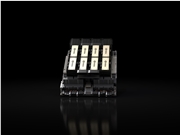Tesla has officially disbanded its Dojo supercomputer project team, ending the electric vehicle manufacturer's efforts to develop its own chips for autonomous driving technology. According to Bloomberg, this decision marks a major shift in Tesla's AI strategy.
Peter Bannon, the head of the Dojo project, has left the company, and the remaining team members will be reassigned to other data centers and computing projects within Tesla. This change occurred after about 20 employees left to start the AI company DensityAI.
DensityAI was founded by Ganesh Venkataramanan, former Dojo head, along with former Tesla employees Bill Chang and Ben Floering. The company is developing data center chips, hardware, and software solutions for robotics, AI agents, and automotive applications.
This decision comes at a critical time for Tesla. CEO Elon Musk has been trying to get shareholders to view Tesla as an AI and robotics company, despite several incidents of unusual vehicle behavior during limited robotaxi tests in Austin last June.
The closure of the Dojo project represents a significant strategic shift. Musk has been discussing this project since 2019, stating that Dojo would be the cornerstone of Tesla's AI ambitions and the goal of achieving full autonomy, as it could "process truly massive video data."
In 2023, Morgan Stanley predicted that Dojo could add $500 billion to Tesla's market value by opening up new revenue streams such as robotaxi and software services. Just last year, Musk also said that Tesla's AI team would "double down" on the Dojo project before the robotaxi launch.
However, starting around August 2024, Musk stopped mentioning Dojo and began promoting the Cortex project, which is described as "a massive new AI training supercluster built by Tesla at its Austin headquarters, designed to solve real-world AI problems."
The Dojo project combined both supercomputing and self-manufactured chip production. Tesla officially announced Dojo at its first AI Day in 2021, unveiling the D1 chip, which would work with NVIDIA GPUs to power the Dojo supercomputer. The company was also developing the next-generation D2 chip to address information flow bottlenecks in the previous generation.
According to sources who spoke to Bloomberg, Tesla now plans to increase its reliance on NVIDIA while collaborating with external technology partners like AMD for computing and working with Samsung for chip manufacturing. Tesla recently signed a $16.5 billion agreement with Samsung to produce its AI6 inference chip, which is designed to scale from powering FSD and Tesla's Optimus humanoid robot to high-performance AI training in data centers.
At Tesla's second-quarter earnings call, Musk hinted at potential redundancies: "Considering Dojo3 and the AI6 inference chip, intuitively we want to find convergence there, basically using the same chip."
This news comes as Tesla's board is offering Musk a $29 billion compensation package to keep him at Tesla and advance the company's AI efforts, rather than being overly distracted by his other companies, including the AI-focused startup xAI.
Tesla's decision to disband the Dojo team reflects a pragmatic adjustment in the company's AI strategy. Shifting from in-house development to collaboration with established technology suppliers may help Tesla achieve its autonomous driving and AI goals more quickly, although it also means giving up some control over chip technology.










